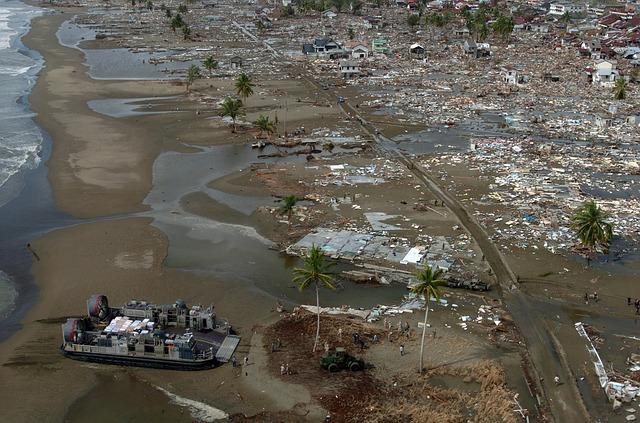Fostering a culture of disaster preparedness
Posted By Anthony Bergin on July 27, 2018 @ 13:10

The devastating floods we’ve recently seen in Japan are an indicator [1] of the kinds of challenges we’re facing as a result of a changing climate.
The landslides and flooding across much of western Japan killed at least 200 people [2]. The Japanese government mobilised 75,000 troops and emergency workers and nearly 80 helicopters [3] for the search-and-rescue effort. The Japan Meteorological Agency noted that parts of southwestern Japan received as much as 10 centimetres of rain per hour [4].
Since the floods, Japan has faced the ‘silent killer’; its weather agency has declared the heatwave that’s gripping the country [5] a natural disaster. The ‘unprecedented levels of heat’ have claimed at least 65 lives in the past week.
Robert Glasser’s recent Strategist post [6] on climate change and risk reduction strategies noted the improvements in disaster management over the past two decades. He pointed in particular to the establishment of early warning systems and evacuation planning as key additions to capability.
But Glasser also noted that we haven’t made much progress in addressing the economic losses from natural disasters, partly because we’re failing to incorporate risk reduction measures into planning and investment, and also because we’re not sufficiently factoring in climate change.
In both Australia and our region, we’re going to need a much stronger culture of preparedness when it comes to natural disasters. And we’re going to have to lift our readiness efforts for catastrophic disasters.
Insurance will play an increasingly critical role in helping individuals and communities recover from disasters. To reduce the financial burden on individuals, communities and governments, there are few more important or valuable disaster recovery tools than insurance.
At the 2018 meeting of Pacific Islands Forum economic ministers in April, the group considered [7] how to develop a climate change insurance facility for the Pacific islands to manage their vulnerability to the financial impacts of climate change.
Glasser stressed the importance of mitigation efforts, noting that over the next 15 years global investment in new infrastructure will exceed the current value of the entire existing stock, providing ‘a once-in-a-lifetime opportunity to reverse the trend of increasing economic losses by embedding additional resilience in the built environment’. This points to the importance of investment in pre-disaster mitigation to enhance resilience and reduce the effects of disasters.
In the US, for example, a recent study [8] by the National Institute of Building Sciences showed that for every $1 invested in mitigation, another $6 was saved on recovery costs later. This should be a marker for Australian state and territory governments to significantly raise their spending on mitigation. Such funding will be important to drive risk reduction.
Fostering a culture of preparedness appears to be a priority [9] of the Australian government’s newly established national resilience taskforce.
But as the head of the taskforce, Mark Crosweller, noted at a recent ASPI event [10] examining strategies for promoting disaster resilience nationally and internationally, we’re going to have to get a lot better at identifying vulnerabilities, rather than just focusing on hazards and exposure to harm.
That’ll involve a system-wide shift in accessing and analysing various types of data about the vulnerabilities faced by people and organisations (insurance companies can help here, as they have lots of relevant risk data). And as Crosweller also noted, we’re going to have to talk a lot more about what we’re prepared to trade or lose when it comes to risk reduction.
No doubt the resilience taskforce will also look at the role individuals can play as the real first responders, and how we can best prepare them to help speed response and recovery efforts.
Countries in our region and Australian disaster agencies will need to work more on continuity planning to ensure that essential government services can be restored quickly and efficiently following a disaster.
By working together as a nation and working with our disaster-prone neighbours, we can reduce the impacts of future disasters by removing historical vulnerabilities. It’s an ambitious goal, yet with the right approaches it’s achievable. Last year’s foreign policy white paper [11] certainly put considerable emphasis on building resilience in the Indo-Pacific.
All of these matters will be raised at the highest regional level when Australia hosts over 50 countries in 2020 for the next Asian Ministerial Conference for Disaster Risk Reduction [12].
DFAT’s humanitarian coordinator, Jamie Isbister, who also spoke [10] at ASPI’s resilience seminar, pointed out that the 2020 conference provides an opportunity for Australia to show real leadership in disaster preparedness and resilience. It will also create a useful platform over the next two years for Australia and the region to focus on the critical partnerships and issues involved in disaster risk reduction in the Indo-Pacific, the world’s most disaster-prone region [13].
Article printed from The Strategist: https://aspistrategist.ru
URL to article: /fostering-a-culture-of-disaster-preparedness/
URLs in this post:
[1] are an indicator: https://www.channelnewsasia.com/news/commentary/japan-flooding-floods-a-warning-for-climate-change-10537112
[2] killed at least 200 people: http://www.abc.net.au/news/2018-07-12/japan-floods-death-toll-hits-200/9985308
[3] mobilised 75,000 troops and emergency workers and nearly 80 helicopters: http://www.abc.net.au/news/2018-07-10/japan-death-toll-rises-to-134-as-rescuers-continue-search/9971820
[4] as much as 10 centimetres of rain per hour: https://www.newscientist.com/article/mg23931862-600-rescue-efforts-underway-after-more-than-130-die-in-japan-floods/
[5] heatwave that’s gripping the country: https://www.bbc.com/news/world-asia-44935152
[6] Robert Glasser’s recent Strategist post: /integrating-climate-change-into-disaster-risk-reduction-strategies/
[7] considered: https://www.forumsec.org/2018-pacific-islands-forum-economic-ministers-meeting-action-plan/
[8] study: https://www.nibs.org/news/381874/National-Institute-of-Building-Sciences-Issues-New-Report-on-the-Value-of-Mitigation.htm
[9] a priority: /the-national-resilience-taskforce-challenges-and-opportunities/
[10] noted at a recent ASPI event: https://www.youtube.com/watch?v=zP3owJOF53A&feature=youtu.be
[11] foreign policy white paper: https://www.fpwhitepaper.gov.au/
[12] Asian Ministerial Conference for Disaster Risk Reduction: https://www.unisdr.org/conference/2018/amcdrr
[13] most disaster-prone region: https://www.unescap.org/sites/default/files/publications/0_Disaster%20Report%202017%20High%20res.pdf
Click here to print.